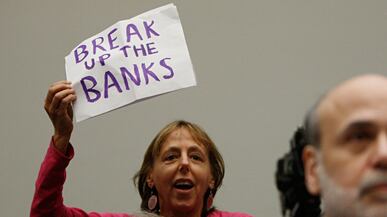Not long ago, I wrote to an academic who studies the question of how people come to and change (if they do) their political beliefs. I was curious, I wrote, about what the existing research says about adults who change from taking a basically conservative view to a liberal one. We all know that most people get a little (or maybe a lot) more conservative as they age: they acquire money, they own property, they have kids, they stop believing that the world can be changed in any dramatic way, they adopt more of an “I got mine, Jack” world view. That part we know. Winston Churchill summed up this journey pithily: “If you’re not a liberal at 20 you have no heart, and if you’re not a conservative at 40 you have no brain.”

Naturally I don’t agree with the second part, and I had experiences with Republicans—just a few, so I admit that this is extremely anecdotal—during the later Bush era who said to me things like: “Gee, I don’t know, war on thin pretenses, torture, and all this hatred of gays or whatever...this just isn’t the party I joined.” These tended to be Republicans of the old school: the country-club types, to use a perhaps outdated typology. They were Republican because they were well-off and didn’t want too much change too fast, but beyond that they’d failed utterly to amass the bilious rage that seems such a necessary precondition for membership in the conservative movement of our time.
In any case, recent events had got me wondering how many Americans had trod the usual path but in reverse. The train-wreck presidency of George Bush had him leaving office with the support of only the hardest-core conservatives—a 24 percent overall approval rating implies that a good quarter of Republicans at least disapproved; maybe a third, depending on how many people were identifying themselves as Republican at the time. And even though Barack Obama won only 9 percent of Republicans’ votes in 2008 (John McCain got 10 percent of the Democratic vote), he did take 20 percent of conservative votes, according to exit polls, suggesting that a certain percentage of voters on the right had decided to take an uncharacteristic look to the left. So, I began to think, maybe some people have made the less likely journey. These last two-and-a-half years have obviously emboldened the shock troops of the right, but surely, I have thought to myself, some of this dyspepsia has alienated a few people, too.
Conservatives will claim that when people see the world as it is, they move ineluctably to the right. I say there are facts about the world that can move at least some people to the left.
Well, it turns out, according to my academic, that at least to his knowledge no one had studied the question. The data set of grown adults who’d switched from conservative to liberal is evidently too small to bother with. This got me thinking, is there no set of experiences that can greet a person after youth that can persuade him or her to see the world with greater tolerance and reciprocity rather than less?
There has to be. A child grows up to be gay, and a conservative parent has to reckon with certain matters in a different way. One loses a job or a pension. Something akin to this happened to my dear departed Aunt Vicky, a flight attendant for many years—if I’m not misremembering, something like the sixth most senior flight attendant on the payroll when Carl Icahn commenced his rapacious destruction of Trans World Airlines. The experience heightened her class consciousness in rather stark ways, but I think I should note here that she was a Kennedy Democrat in the first place.
Conservatives will chortle over all this and will gloat: yes, when people see what the world is really like, and when the scales fall from their eyes, they move ineluctably and appropriately rightward. I say there are facts usually hidden from view that would move at least some people to the left. Not a mass of people, but enough perhaps to make a difference every fourth November. Most of these facts are economic—about the extent to which inequality has increased in this country, about the reduced tax burden on the rich, about the stagnation of middle-class incomes since the mid-1970s and the indecent explosion of high-end incomes over that same time, et cetera. Paradoxically, these facts are so little known because they are so well known. That is, they are well-known to everyone involved deeply in the political process and the manufacture of news, and thus they aren’t “news” in the explicit sense because there’s nothing truly new in a “new” report re-stating the facts for the umpteenth time. But the vast majority of people still don’t know them and, because they’re not news, never will.
Anyway: lacking academic research, I’m happy to do some of my own. Do we have any readers out there who have flipped from right to left after becoming adults? What were the motivating factors—economic, social, personal, or just general “Republicans have gone crazy”? Inquiring minds (and there are more of them than you’d think) want to know.
Newsweek/Daily Beast Special Correspondent Michael Tomasky is also editor of Democracy: A Journal of Ideas.






